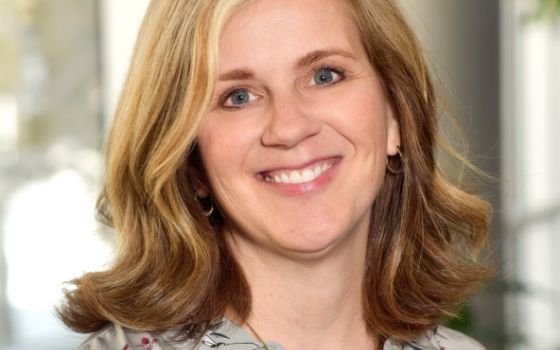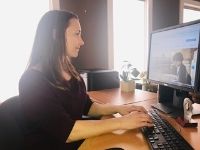By University Advancement and Communications

Dr. Heather Hadjistavropoulos is a University of Regina psychology professor and the Online Therapy Unit's executive director. Credit: U of R Photography
Anxiety, low mood, sadness, loneliness, anger, and grief are all natural reactions to the way that the COVID-19 pandemic has upended the lives of people around the world and here at home.
Everything is different. Our family, social, work, and school lives have all been affected.
With all of this change and uncertainty, many of us are having difficulties coping with the complex feelings that present themselves in myriad ways, both emotionally and physically.

Marcie Nugent is the coordinator of the U of R's Online Therapy Unit. Credit: U of R Photography
"The University of Regina's Online Therapy Unit offers online cognitive behaviour therapy to help those who are suffering with depression, anxiety, panic, trauma, alcohol misuse, and more," says psychology professor Dr. Heather Hadjistavropoulos, the Unit's executive director.
"It's an unusual, unsettling, and anxiety provoking time. Many people's lives have been dramatically altered. Some have been laid off from their jobs, others are working remotely while looking after children, and still others are having to work to serve our community while trying to stay healthy. For the most part, our routines, such as going to work and the gym, hanging out with friends and family-those activities that help to keep us grounded-have vanished," says Hadjistavropoulos.
"On top of all that, many of us have to physically distance ourselves from our support systems. Even the act of getting groceries is causing people stress and anxiety."
The Online Therapy Unit's coordinator Marcie Nugent, says that online cognitive behaviour therapy provides education and guidance on simple but effective techniques to improve well-being.
"Our online therapy programs allow people to overcome the barriers of receiving face-to-face therapy by delivering safe, effective, patient-friendly treatment materials over the internet. And, the Online Therapy Unit has increased our capacity to take on more clients in light of the pandemic," says Nugent.
Along with Hadjistavropoulos and Nugent the Unit also includes 11 clinicians, six employed by the Unit and five employed by the Saskatchewan Health Authority. The team also includes 10 students-undergraduate, graduate, and postdoctoral fellows-four research assistants/associates, and four IT staff.

Kerry Spice is one of the Online Therapy Unit's clinical research associates. Credit: Photo provided by Kerry Spice
At this time, the Online Therapy Unit offers several different courses:
Wellbeing for Mental Health (Saskatchewan residents only)
UniWellbeing for Post-Secondary Students (Saskatchewan residents only)
Wellbeing for Chronic Health Conditions and Pain (Saskatchewan residents only)
Alcohol Change Course (Canada-wide)
PSPNET, which is also led by Hadjistavropoulos, offers a wellbeing course tailored to meet the needs of public safety personnel, police, firefighters, paramedics, correctional employees, border services personnel, and dispatch personnel.
To access services, clients complete an online screening, which includes questions about how COVID-19 is impacting them. After the screening, a therapist from the Unit completes a brief telephone screening with the client, then assigns clients to the most appropriate course.
"Our standard courses are eight weeks long, with once-a-week therapist support provided by email. However, our screeners will assess if there is a need for this to be adjusted in light of COVID-19," explains Nugent. "If needed, we will offer flexibility in terms of timelines and amount of support."
The Online Therapy Unit offers their services for free and to those who are 18 and older. To contact the Online Therapy Unit, please visit: www.onlinetherapyuser.ca, call 306-337-3331 or email: online.therapy.user@uregina.ca.
To contact PSPNET, please visit: www.pspnet.ca or email pspnet@uregina.ca.
Check out #UofReginaCares for more stories about U of R faculty, students, alumni, and staff who are using their ingenuity, resolve, and hearts to care for our community during these challenging times.












